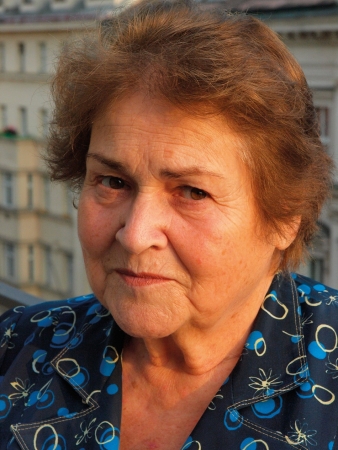
Curriculum Vitae number 71266
It is man’s destiny to live. One should certainly not suff er for having been born a Jew, for example. This is also true of the fate of the involuntary inmate of the Terezín ghetto, Evelina Merová, the girl from room 28.
Eva was born on 25th December 1930 to Emil and Ilsa Landa (her father’s original name was Löwy), and had an elder sister, Líza. Until Eva was three they lived in Pařížská ulice in Prague, and later moved to a modern fl at in Letná. Her father had his own fi rm “Materials from Horsehair – Landa”, and her great-grandparents on her mother’s side, Nathan and Ernestina Klein, owned a wholesale drugstore. Eva had a happy and peaceful childhood. She started attending a Czech school, learnt well and exercised with the Sokol group. Then came 15th March 1939. It was snowing and a cold wind was howling when Eva went to school as usual and saw that on one of the houses in their street a fl ag had appeared with a swastika on it. She recalls how that day their teacher had told them about the rise and fall of Napoleon, and although Eva was very young, she understood that the teacher was actually talking about Hitler. “I think my parents were unwilling to leave their homeland and give up everything to move somewhere they didn’t know. They believed that the nightmare would pass. The anti-Jewish laws, however, tried to take away our dignity, our property and our peace, and they even took away my fi rst friend – my canary Punťa.”
In December 1941 the first transports began to run to Terezín. Eva’s pregnant sister Líza left on the transport “M” of her own asking, as she wanted to leave the country with her husband, František Petschau. She later gave birth to child in the ghetto, even though it was forbidden, a little boy named Ladislav. In spring 1942 her granddad and grandma Klein were scheduled for transport to Terezín; on 28th June 1942 at six o’clock in the morning the Landas too came to the meeting point at the Trade Fair Palace and on 2nd July were taken away to Terezín. Eva was placed in “mädchenheim” L 410 in room number 28. “When I think back to the war and the holocaust, there’s always one point that sticks in my memory – our heim in the ghetto, our room 28. I spent eighteen months in Terezín, which is not long in the life of adult, but for a twelve-year-old child it seems like an eternity. With my childhood torn away from me, I started to think about things and to grow up. The heim helped me get through a horribly diffi - cult time. However, only fi fteen out of the sixty girls who shared room 28 were so lucky.” In December 1943 Eva was taken from her hospital bed (she had contracted encephalitis) and was transported to Auschwitz. It was only later that she realised that “their” transport was the only one of the three that did not go through the selection process at the ramp. These prisoners were sent to the BIIb family camp designated as “SB – Sonderbehandlung” (special treatment), which meant only one thing – to go to the gas chambers after six months. Yet Eva and her mother got through Mengele’s selection and were assigned to dig trenches. First in the camp in nearby Stutthof and later at Dörbeck.
Eva’s granddad died after three weeks in Terezín; her grandma did not pass the selection process when she arrived in Auschwitz. Eva’s sister Líza and her little girl, who had left Terezín for Auschwitz on the last transport on 28th October 1944, met the same fate. Her husband disappeared like thousands of others – without a trace. Eva’s father died of pulmonary tuberculosis in Auschwitz and her mother passed away there in November 1944. Eva was left all alone. She lost her shoes, her feet froze, and so she should have been sent back to the gas chambers in Auschwitz as she was unfi t to work. Destiny, however, had other ideas. After the exhausting march to the train the Nazis realised that the local station existed no more, and so they returned to the camp with the prisoners. Eva couldn’t even walk by then; she had to stay in bed and there was the risk that her leg would have to be amputated. The front drew closer, however, and at the end of January 1945 the Nazis abandoned the camp in a hurry. Before they did, they murdered a lot of prisoners by giving them phenol injections or bludgeoning them with their rifl e butts. The camp near what is now Gutow in Poland was liberated by the soldiers of the Red Army, who took the survivors along with them to a military hospital. From there Eva was taken by ambulance train to the town of Syzraň in the Kuybyshev region of the Soviet Union. On the train she met a Jewish paediatrician named Mer, who was in charge of transporting the sick and later adopted Eva.
So Evelina Merová found a new home in Leningrad (Saint Petersburg) and didn’t come to visit Prague until 1960. She did a course in German studies in the Soviet Union and married Simeon Naimark, with whom she had a son, Viktor, and a daughter, Irena. She was widowed in 1985 and after retiring 1995, her dream of returning to her homeland came true. Her daughter still lives in Saint Petersburg and her son, who emigrated from the former USSR, lived in Frankfurt am Main. Evelina has two granddaughters, Anna and Alisa, who give her a good reason to travel, perhaps between Frankfurt, Prague and Saint Petersburg.
For Památník Terezín Luděk Sládek
Nesouhlas se zpracováním Vašich osobních údajů byl zaznamenán.
Váš záznam bude z databáze Vydavatelstvím KAM po Česku s.r.o. vymazán neprodleně, nejpozději však v zákonné lhůtě.